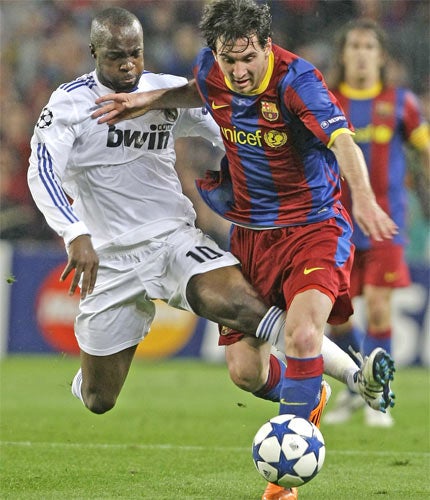James Lawton: Messi shines brightest to banish memory of Bernabeu's dark night
Lionel Messi did much to grow his ever more vibrant mystique. He ran into space with routine genius and took Ricardo Carvalho repeatedly to the edge of oblivion

There was a flutter of yellow at the end, Emannuel Adebayor yanking the shirt of Lionel Messi, but finally the godforsaken, stomach-turning El Clasico series came out of the dark.
This, to a significant degree, was maybe the result of an agenda drawn up in the physical absence of Jose Mourinho. Barcelona, hopefully shorn of the worst of their contribution to the match in Madrid which shamed football to its core, will surely grace Wembley in the Champions League final later this month.
They may not, as some contend, be the best club team football has ever seen, but, heaven knows, they are easy on the eye.
Last night their performance was especially fascinating in the light of one pre-match theory that had nothing do with the machinations of Real Madrid's coach. It was the claim that, if not now, one day for sure Messi will be proclaimed the best footballer the world has ever seen.
In the middle of all the speculation about the game's most assiduous attention-grabber, whether Mourinho was even now hiding in a laundry box or slipping into a silk dressing gown and taking, perhaps, an admiring glance at the mirror back in the team hotel, Ossie Ardiles, a mentor for the young Diego Maradona, made his sweeping assertion in support of the man more naturally at the centre of the world's football dreams.
If Messi wasn't better than Pele and Maradona right now, it was as sure as the sun rising over the pampas that inevitably one day he would prove himself the greatest we have ever seen.
Normally you balance such statements with a wisp of salt, even if they come from a man of Ardiles' status. You think also of Cruyff, Di Stefano and Puskas, and remember that when Pele was 17, six years younger than Messi now, he was scoring five goals against France and Sweden in the final stages of the 1958 World Cup.
Still, it eased the obsessive talk of Mourinho – as did much of the flow of a first half which was mostly played in a different world to the one that crowded the Bernabeu with such ugliness last week. It was also true that if Messi could not produce the clinching evidence – and nor is he likely to do so any time before the next World Cup in Brazil – he still did much to augment his ever more vibrant mystique.
He ran into space with routine genius and took Ricardo Carvalho, who picked up an early yellow, repeatedly to the edge of oblivion before releasing David Villa, whose shot would have ended the contest but for a typically resilient piece of work by Iker Casillas.
Yet, with Mourinho banished to who knew where at the outset, and with Kaka and Gonzalo Higuain reinstated, Real did look like a team who were interested in scuffling for more than scraps. Indeed, Cristiano Ronaldo made a break early in the second half which might have brought the battle back to life if Javier Mascherano's theatrical fall – a relatively rare one, mercifully – had not persuaded the referee to wipe out the net-billowing shot that ensued.
Yet there was always the sense that, with Messi again in such a fertile mood, the Barça execution squad could strike at any moment. When they did it was another player of historic dimensions, Andres Iniesta, the relentless little man of La Mancha, who cut Real in two, his beautifully weighted pass sending Pedro in for the goal that appeared to have finally brought a close to a match which football in the end was required to escape from with its life and a modicum of integrity. However, if Real were dead they were rejecting the effects of rigor mortis. Angel di Maria showed wonderful commitment when he weaved his way into position to shoot against the post and Marcelo, a consistently combative figure in the face of the Barça tide, along with Lassana Diarra, smashed in the rebound, scooped the ball from the net and said that there was still something for which to play.
It was something that was the antithesis of the miserable moral abdication back in Madrid. It was a little item called pride, a desire to play, with a degree of self-belief, even open-heartedness, and this impression was maintained even when Marcelo drew a yellow card for a sliding tackle on Messi at the corner flag. This was a player who could be set to be at the limits of his effort rather than any bleak desire to destroy.
Real could do no more than play the game, Ronaldo producing a couple of runs fuelled mostly by speculation, but against the background of all that happened before this, too, seemed like a kind of deliverance.
The hierarchy of Real will no doubt be slow to see it this way but at least this is no longer football's problem. It is one for Jose Mourinho, who is now required to produce an extremely special resolution.
Subscribe to Independent Premium to bookmark this article
Want to bookmark your favourite articles and stories to read or reference later? Start your Independent Premium subscription today.

Join our commenting forum
Join thought-provoking conversations, follow other Independent readers and see their replies